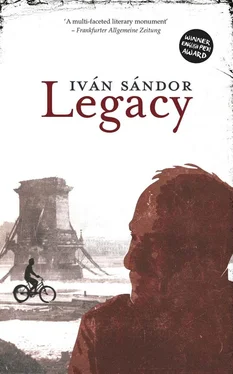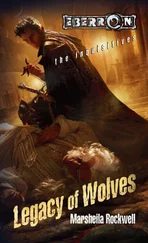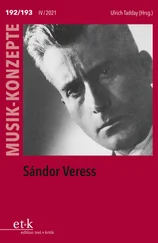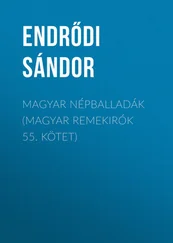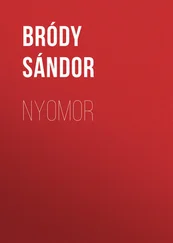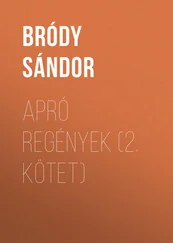
Vera is smoking Kossuth cigarettes, her chin resting on cupped hands. We are sitting on a terrace of the Duna Hotel. It is the summer of 1963.
We come face to face in Kigyó Street, just near where the central thoroughfare of Lajos Kossuth Avenue leads on to the Pest end of Erzsébet Bridge. We had not seen one another for eighteen years. She had on a sleeveless blouse with a floral pattern and a light-blue pleated skirt. Her hair was cut short with a sun-bleached wave at the front.
Her eyes were not always so very blue, nor were lips so sinuous. She is not wearing a bra — when she leans forward one can see her small but nicely shaped breasts. She has a son, who right now is at a summer camp. Her husband, an engineer, is away representing his firm in East Germany. She is a secretary at some institution with a lengthy name, and she tells me what it is known for short as if that were any concern of mine.
In Kigyó Street our steps synchronize. The sun is shining directly ahead of us. On the terrace she asks for a Coke. She sets her chin on her cupped hands in exactly the same way as she did sitting by the piano when I tried to play ‘Tango Bolero’ on the keyboard. She lights a cigarette, blows out the smoke, places her elbows on the railing then sets her chin back on her hands.
No, I don’t smoke.
Your mother used to smoke, she says. Every morning in Pannónia Street when we read off a menu all the things we would like to eat and we got down to the Dobos torte at the end, she said that instead of the cake she would rather smoke two Miriam cigarettes.
I don’t recollect that, I said. I asked whether she wanted a dessert now.
Dobos torte?
It was me who asked, wasn’t it? runs through my mind. She exhales smoke and asks again. Dobos torte? That would be really good.
So, I’ll order it, I say. But only if you also have it, she says.
You found it very hard to get used to being my sister, I say.
Yes, it was hard.
Her laugh is shrill, just like when she was a young girl.
Now she is bent forward, stiffening up. She is not looking at me; I can tell that she is aware I can see down the front of her dress as far as her nipples.
You always did read right through the menu, I say finally.
Your mum made me practise the name so that I wouldn’t blurt out my own name if I was asked.
I was aware that Vera’s mother did not survive the war. Nor her father. My parents last saw her mother at Hegyeshalom.
We eat Dobos torte.
Dark clouds are scudding over the Danube from Buda. The waiters are dashing around, collecting the tablecloths before it starts to rain. We go over to a patisserie. A duo is playing, a pianist and a drummer.
Ten years later the Duna Hotel was demolished, or maybe it was only five years. The Intercontinental Hotel is thirty years old and now goes under the name of the Marriott Hotel.
We drink two sibling cognacs.
I can’t recollect which of us said that what we were drinking were sibling cognacs.
I do not dare take her by the hand; it is she who takes hold of mine. She guides it down under the table. Her thigh is skinny, her upper arm, too.
On the fourth floor at number 36 Pannónia Street we lie under the bedclothes in a cold room, the windows of which have been blown out. On the bedspread is Soproni’s duffel coat. We are not hugging each other; there is no room for my left hand so I place it on her thigh. Under her tracksuit trousers are a pair of Mother’s warm, long-legged knickers. Her mouth is by my ear. She is breathing heavily. The drone of an aircraft; it is in diving that the fighter-bombers let loose their bombs. The anti-aircraft batteries by the Comedy Theatre bark out their response.
We down the cognacs simultaneously. There’s something I would like to talk over with you, she says.
I pay the bill, and we set off.
She takes a bottle of Lánchíd cognac out of the drinks cabinet. There is a standard lamp in the corner and two armchairs. We drink the glasses of cognac standing — I would like a sibling kiss, she says. What makes her so purposeful? I wonder. All I see in her eyes is a bright blue. Our lips brush each other’s face.
Yes, Mother warned us to be careful. Someone had said that it was quite certain we were not brother and sister. While Mother was admonishing us I could not see her face in the dark cellar. Would it be better to stage rows? I retorted. Should we have a row twice a day? No, no, not that, Mother swiftly answered. She seemed to be at a loss. Already then she was ten years older than Vera is now.
She walks over to a chest of drawers, her steps Karády style. She lights up a cigarette. In a silver frame on the chest of drawers is a portrait of her mother and father and a young boy with a teddy bear. Herself and a man, possibly her husband. I don’t stoop to take a closer look, I’m not interested in her husband, and Vera, for her part, did not ask me about anything. The two of us were the original couple, siblings in the depths of the cellar.
That was the time she ran an index finger over the portrait of her mother, from the lips to the eyes, in the way Ágnes Hirschi did in the lobby of the Grand Hotel. Slowly as if she were tracing its contours.
She sits down on the sofa, unbuttons the top button of her blouse, then the next. Lies back.
Undress me, she says.
I am not wearing a vest under my polo shirt. Wait, she says, sit next to me. Take my blouse off. Lie down next to me. Her breasts are plum-shaped; the two darkening nipples stand erect. Take off your underpants, my knickers.
She is clamping her legs together so I cannot get at them. She giggles. I was more adroit then.
On Francia Road, on the big table in the workshop where Jolán Bors glued bags. I reached the palm of one hand under Vera’s bottom. I try. She shifts a little to assist. She reaches back and takes a tablet from the back of the sofa. Slip it in, she whispers. Is this the way the two of you do it? I lean over. There is no tenderness in her gaze. This is how we do it. I can see that she is already on the way; there will be a route ready for me to follow. I carefully push the tablet into her. More, she whispers as if it were not me but my fingers she was talking to. Leave them in a good long time, she says to my fingers, that’s right, like that, for a long time, everywhere, more, more, now come.
Her eyes are again steely blue slits. We are negotiating separate paths while her body moves with mine. I am on the border, my face not yet pressed into her neck. Her cheeks blush, the features grow taut, the panting ever shriller, already squealing. Why does she open her eyes so wide? What is she searching for in my face? The screech is the same as of old and yet not the same, a quite different scream. My face cannot press into her neck. I am compelled to watch the fixed pupils, like those of a corpse, as if what they were looking at was beyond me, but she was only able to look into my face.
I later asked her what it was she was looking at. Or rather, I asked, What did you see?
Nothing, she says. When it comes down to it, nothing, thank you. She kissed me in sisterly fashion on the cheek, although in our lovemaking there had been nothing that could be considered sibling-like.
Some time was spent like this, with us lying next to each other without bedclothes. She placed one of my hands on a breast, she placed the palm of one hand lightly on my crotch. I should not be shocked by what she is about to say, but what had finally happened just now had never before happened to her; she had supposed many times before that she would be unable to find release without me, although she did not say from what. She had become resigned to the fact that it was futile, that moment could not arrive. She had tried with others, and not just her husband, but never before, you know … What was it like? Like never before … Now it had happened at last, she chuckled. Thank you, brother.
Читать дальше
